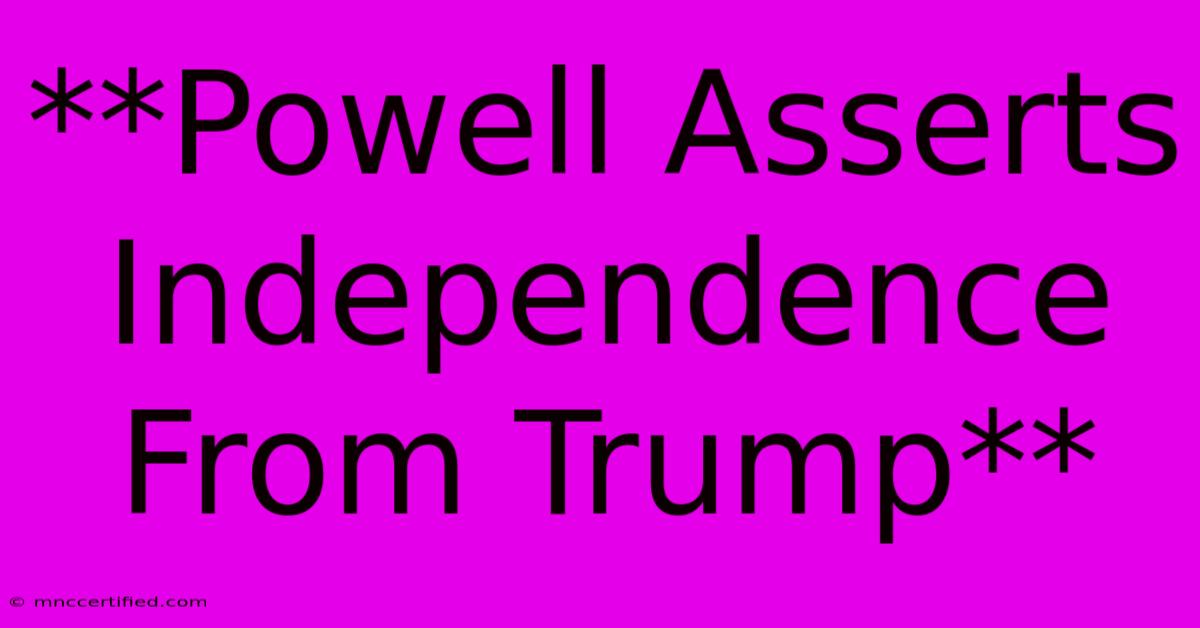**Powell Asserts Independence From Trump**

Table of Contents
Powell Asserts Independence From Trump: A Turning Point in US Monetary Policy?
In a move that sent shockwaves through the financial world, Federal Reserve Chair Jerome Powell asserted the central bank's independence from political pressure, effectively drawing a line in the sand against former President Donald Trump. This bold declaration, delivered during a congressional hearing on July 22, 2020, marked a pivotal moment in the relationship between the Fed and the White House, potentially impacting the future of US monetary policy.
A History of Tension
The relationship between the Fed and the White House has often been fraught with tension, particularly during periods of economic uncertainty. Trump, known for his vocal criticisms of the Fed's interest rate decisions, had repeatedly pressured Powell to lower rates, even going so far as to publicly label him "a terrible Fed Chairman."
This pressure intensified as the COVID-19 pandemic unfolded, with Trump advocating for aggressive rate cuts and an expansion of quantitative easing. However, Powell, citing the Fed's commitment to price stability and maximum employment, maintained a cautious approach.
Powell's Assertive Statement
During the July 22 hearing, Powell firmly stated, "The Fed is independent within the government. We make our decisions based on our assessment of the economic data and our judgment." He further emphasized that the Fed would not be swayed by political considerations, saying, "We don't respond to pressure from the president or anyone else in the administration."
This unambiguous assertion of independence, coupled with the Fed's decision to maintain interest rates near zero, effectively signaled that the central bank would not bow to political pressure. This decision, while potentially unsettling to some, could ultimately lead to a more stable and predictable monetary policy environment.
Implications for the Future
Powell's statement has far-reaching implications for the future of US monetary policy. By asserting the Fed's independence, Powell has ensured that the central bank can continue to make decisions based on economic data and professional judgment, free from political interference. This could lead to greater confidence in the Fed's ability to manage inflation and promote economic growth.
However, it's important to note that the future of the Fed's independence remains uncertain. The current administration, while less vocal in its criticisms, has signaled its desire for lower interest rates. Furthermore, the potential for political pressure on the Fed is always present, particularly during times of economic stress.
Conclusion
Powell's assertion of independence from Trump marked a significant turning point in the relationship between the Fed and the White House. This bold statement serves as a reminder of the importance of an independent central bank in ensuring a stable and predictable monetary policy environment. While the future remains uncertain, this event has undoubtedly raised the stakes in the ongoing debate about the appropriate role of the Fed in the US economy.
Keywords: Powell, Trump, Fed, Federal Reserve, Monetary Policy, Independence, Interest Rates, Quantitative Easing, Inflation, Economic Growth, Political Pressure, Central Bank, US Economy.

Thank you for visiting our website wich cover about **Powell Asserts Independence From Trump**. We hope the information provided has been useful to you. Feel free to contact us if you have any questions or need further assistance. See you next time and dont miss to bookmark.
Featured Posts
-
Nfl Thursday Bengals Vs Ravens Game Preview
Nov 08, 2024
-
Shetland A Fresh Start With Ashley Jensen
Nov 08, 2024
-
Germanys Government Collapse What Now
Nov 08, 2024
-
Parent Withholding Insurance Information
Nov 08, 2024
-
Bank Of England Cuts Rate Your Guide
Nov 08, 2024